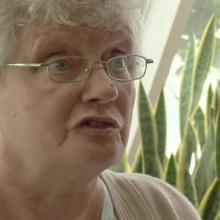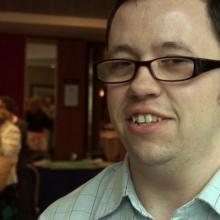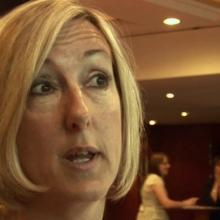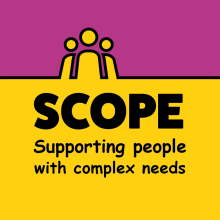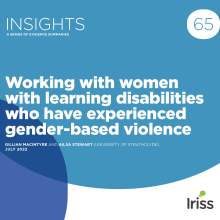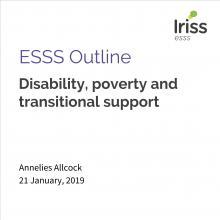What do you hope to achieve with this event?
Jan Murdoch - Scottish Consortium for Learning Disability
This week is learning disability week, and we thought it was really important to spend some time thinking about the histories and stories and experiences of people with learning disabilities. We're really keen that people's experiences don't get lost, and we're conscious that people have missed out on the opportunity to take part in mainstream historical accounts of what's happened in Scotland's life and in the lives of Scotland's citizens.
So we thought it was really important to have a conference where we gave people with learning disabilities a opportunity to talk about their experiences and their histories.
Why have you come today?
Brian Robertson
I'm here helping the Scottish Consortium for Learning Disabilities promote ESAY, it's a program I work with. It's about good information and bad information and how to get information off of computers and the Internet.
James Rankin
I've come today to learn a lot and broaden my mind a bit. Learn what's going on and maybe help me and other ones in the future.
Lovetta Williams - Scottish Health Council
I work for the Patients Consortium within the Scottish Health Council. Our responsibility is to ensure everybody is engaged in the planning and delivering of health services. Usually people with learning disabilities are kind of left out of the process. I think as a way of improving our way of engagement, engaging with this group of people, probably I will be able to come here and make some contacts and network.
What are you hoping to get from this event?
Brian Robertson
Probably that more folk have taken an interest in people with learning disabilities and helping them live the life that they want, and not telling them how to live their life. Letting them make their mistakes. I think that would be good, if people learnt that, to let people with learning disabilities make mistakes, because we're only human like them.
Kirsten Stalker - University of Strathclyde
I think I would like to know more about how to develop further research in the learning disability field in Scotland, involving people with learning disabilities in the research process.
Ewan Hamilton
Trying to get employment for disabled people, that's a big issue.
Lovetta Williams - Scottish Health Council
Lovetta Williams (Scottish Health Council): Yes, personally, because my team, for instance, is for the organization and development of staff. So if I am aware of the issues then the learning would be spread across the organization.
Why is it important people tell their stories?
Furrah Arshad - Ethnic Enable
I think it's extremely important that people with learning disabilities get to tell their stories because previously, and up until now, we've seen that there's no real platform for people to actually be able to engage and to share their experiences in learning from others. But I think an event like this is absolutely crucial and it's vital for people with learning disabilities to come together with service providers and voluntary organizations and really just open up and join in the debate and listen to what people with learning disabilities have to say.
Kerry Ann Adams
People think that because you've got a disability that you can't do things for yourself, and it's wrong. I think that people should get together in communities and start forming groups so that people like with my disability -- I've got (inaudible) Syndrome -- can get to know one another and get to fight it together instead of having some people that don't understand it.
Kate Skinner - Iriss
I think it's to do with the fact that their pasts are full of all sorts of things. And some of them who, like Mabel have grown up in institutions have lots of stories about lots of incidents, lots of examples, about bad things that have happened to them.
But the really important thing is their story. They don't have another story somewhere else. They have the story about where they grew up. So those memories, even though some of them are bad, are actually very, very important. But there are good ones, too.
Lynda Hutchison
I think it's important they should talk up for themselves, because they're not any different from any other human being. They're just a normal human being with learning disabilities. I mean, I've got my learning disabilities and I can talk up for myself. I can talk up for people's rights and talk up for other people, make sure they get the best out of life.
What can we learn?
Caroline Gray
I think that communities learn to be a bit more compassionate and understanding. And for people coming into the community, because for such a long time things have been done to people and people have not really been asked how they're feeling about it.
Furrah Arshad - Ethnic Enable
I came of a combination of things. I think I've actually learnt that people with learning disabilities are citizens, they're normal human beings like the rest of us, that had experiences and shared feelings. They've had happy things happen to them, they've had sad things happen to them, and more than anything, they want to aspire to things as well. They want to be able to have an equal chance of having a good, well rounded, happy life, really. I think it's a combination of those factors that, more than anything, should hopefully allow people to see people with learning disabilities as being human beings and not labeled by their disability.
Final Thoughts
Kate Skinner - Iriss
I suppose what the conference has done is identified this as a way of interesting people in services with learning disabilities, helping people learn about what's really important to service users and so on. So maybe we've started something. Maybe we just need more and more stories.
Lynda Hutchison
People with learning disabilities, don't be afraid to speak up. Go ahead and do it. Speak up for yourself. Make life with what you've got.
